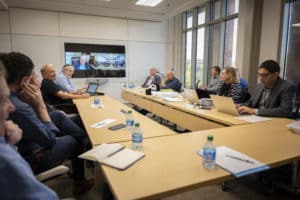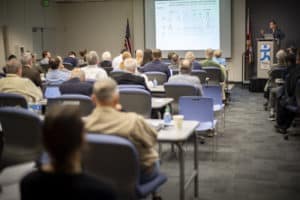Experts in spatial disorientation review innovations to mitigate risks of aviation mishaps
Published 3.28.23
Recently, the Florida Institute for Human and Machine Cognition hosted a gathering of international experts in spatial disorientation, the leading cause of deadly mishaps in military and commercial aviation.

Spatial Orientation Modeling Experts Workgroup met this month at an IHMC-hosted conference. Credit: IHMC staff.
Over three days in late March, 87 members of the Spatial Orientation Modeling Expert (SOME) Workgroup shared the latest techniques to model spatial disorientation mishaps and to showcase the latest developments designed to mitigate the risk. The hope is to craft recommendations for future research on the model and designs of next-generation aerospace vehicles to improve pilot situation awareness and counter spatial disorientation.
The Principal Investigator from IHMC for the workshop was Senior Research Scientist Dr. Jeff Phillips, an aviation human factors expert who has worked extensively in this area. The panels included astronauts Ken Cameron and Bill Shepard, who spoke at length about the spatial disorientation they experienced in space.
The group has met twice before, once in 1994 and again in 2019. The first meeting led to the publication of the book “Spatial Disorientation in Aviation,” one of the most comprehensive references on the topic. This year’s meeting will result in the publication of a second volume.
Senior Events Specialist Michelle Bowers said the workshop is just one of at least a dozen professional workshops, panels, and conferences that IHMC will host in 2023. Such gatherings reflect IHMC’s place in the scientific community — and serve as a draw to highlight the Pensacola area to researchers, scientists, and experts from across the globe.

IHMC hosted a conference of more than 80 international experts in spatial disorientation, the leading cause of aviation mishaps. Credit: IHMC staff.
“In the local economy, there is a substantial community impact for restaurants, flights, hotels, rentals, retail shopping and much more, including showcasing the greater Pensacola community,” Bowers said.
In addition to these professional gatherings, the Institute hosts an Evening Lecture series, open to the public, that features experts and researchers in fields from robotics to human healthspan and performance, public health, urban planning and more. Stay up to date on our public lectures at this link.
IHMC’s podcast, STEM-Talk, is another avenue for outreach. STEM-Talk hosts Dr. Ken Ford, IHMC’s CEO and founder, and Dawn Kernagis, research scientist, have conversations with some of the most fascinating scientific minds. With more than 4 million total show listens over 150 episodes, STEM-Talk is a home for full and frank conversations with the most interesting people in science and technology. Visit https://www.ihmc.us/stemtalks/ to keep up with the latest episodes or look for it wherever you listen to podcasts.
IHMC is a not-for-profit research institute of the Florida University System where researchers pioneer science and technology aimed at leveraging and extending human capabilities. IHMC researchers and staff collaborate extensively with the government, industry and academia to help develop breakthrough technologies. IHMC research partners have included: DARPA, the National Science Foundation, NASA, Army, Navy, Air Force, National Institutes of Health, IBM, Microsoft, Honda, Boeing, Lockheed, and many others.
Latest News
- David Bear joins IHMC Board of Directors
- STEM-Talk: Michael Schmidt on building a space-faring civilization
- Florida Blue award supports health and wellness research and outreach at IHMC
- STEM-Talk: Ken Forbus on AI and his development of the Structure Mapping Engine
- STEM-Talk: Pascal Lee on returning to the Moon — and heading to Mars
- Aging Symposium draws experts to IHMC
- IHMC hosts Fredric G. Levin Lung Care Symposium March 27-28 in Pensacola
- Humanoid robotics and exoskeletons lead latest IHMC newsletter
- Celebrate Robotics Week at IHMC Open House on April 11, 2025

